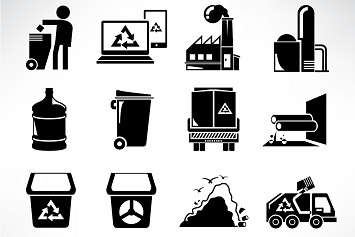Smart technology has been making impacts on business worldwide, and its use in streamlining efficiencies in hazardous and solid waste management should be of great interest to environment, health, and safety (EHS) and facilities management (FM) professionals.
To get the scoop on smart waste management technologies, we recently sat down for a question-and-answer session with Keith Woodward, EVP of Marketing at Contelligent (recently rebranded from OnePlus Systems).
What sets Contelligent apart in the waste management space, and why did the company choose now to rebrand from OnePlus Systems?
We have been helping companies for 30 years manage, maintain, and drive action based on the information within their tanks and containers, giving them the ability to improve operational savings. During the COVID-19 pandemic, customers and partners alike turned to us to manage variability in their operations to help avoid disrupting their supply chain and, in turn, maintain a safe environment.
The rebrand is the culmination of our strong core values and the rich history upon which our company was built, and it cements our unwavering commitment to our clients around the world. Furthermore, the name Contelligent brings together all our container-monitoring products under a single brand and user experience.
We are the pioneer in this market. Our history and expertise afford us the ability to deliver the best and most comprehensive products and services in the market. We also understand the needs across industries and possess a well-established track record and deep industry knowledge to help. As such, in 2019, we expanded our Customer Care and Success department to create a more seamless customer experience for onboarding, training, and real-time troubleshooting.
How are smart technologies changing hazardous and solid waste management?
Information. Not unlike how smart watches can help consumers tune their diets and exercise routine, smart waste technology is helping organizations tune their waste and recycling operations using the information from within inside their containers. For example, let’s say you are responsible for a facility that is experiencing a surge in production and, as a result, is generating a lot more trash. The last thing the facility manager or plant supervisor needs to worry about is if their containers need to be picked up. Smart technology removes the burden of using staff to continuously monitor or check the status of their containers. Our platform automatically notifies the hauler when the container is ready for pickup, removing the risks of overspilling waste, messy docks, and even downtime.
Has the COVID-19 pandemic changed organizational waste management? How so?
COVID-19 has created shifts in waste volumes, more variability, and a growing concern for safety. Smart waste monitoring removes the guesswork of when your containers are full; it does it for you so that you and your staff can focus on other critical tasks. Streamlining your waste and recycling programs with smart technology can reduce safety incidents and other associated hazards related to poorly managed waste and recycling programs.
With more people working remotely or in shifts, smart waste technology allows companies to manage their waste and recycling operation remotely; whether it’s 1 facility or 300, smart waste technology centralizes all of your containers so that managers gain visibility and control into their entire operation.
Which industries are most affected by all these changes and challenges within waste management, and how can they stay ahead of the game?
Almost every industry has felt the impact of COVID-19. We believe the coronavirus will inspire many organizations to rethink and retool parts of their operations. And with a widening skills gap among skilled labor workers, companies need to pursue the benefits of automation. Using smart technology automates the process, which, in turn, will offset the potential skilled-labor gap, improve operational efficiency, and maintain heightened safety and compliance obligations.
What’s the takeaway for EHS and FM professionals? How can smart waste management help them address their compliance and cultural obligations?
Information is key. It drives action. Information provides you with the means to govern your waste and recycling operations more efficiently and automates roles that would otherwise require staffing—roles that can be unreliable, inefficient, and potentially harmful to employees. It can also help EHS professionals quantify their waste diversion and reduction efforts as they gain greater knowledge of the volumes and frequency of their wastestreams.
Since the beginning of organized efforts to deal with the governance of trash, waste management has consistently followed the same basic model. Smart technology is opening new doors, and the advent of smart waste monitoring technology provides a pathway for future innovation and efficiency across facilities.
 Keith Woodward has over 20 years of experience in emerging start-up and established high-technology companies. Over the course of his career, he has demonstrated success in building high-performing marketing teams to align and scale business growth. Currently, Woodward is the EVP of Marketing at Contelligent (formerly OnePlus Systems), where he is responsible for brand marketing, demand generation, product marketing, and media relations. Keith Woodward has over 20 years of experience in emerging start-up and established high-technology companies. Over the course of his career, he has demonstrated success in building high-performing marketing teams to align and scale business growth. Currently, Woodward is the EVP of Marketing at Contelligent (formerly OnePlus Systems), where he is responsible for brand marketing, demand generation, product marketing, and media relations. |

